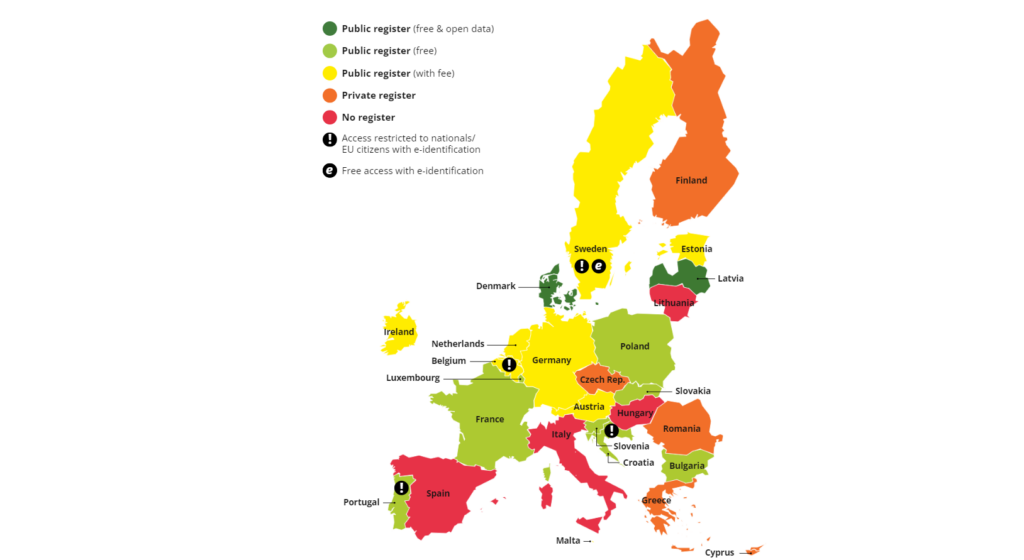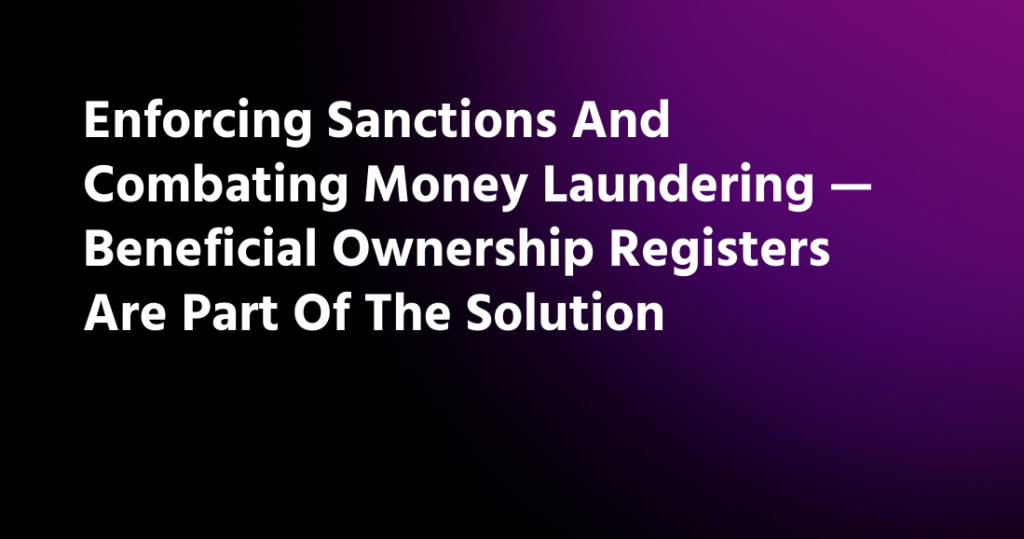Key Takeaways
Creating beneficial ownership registers is an important step in combating money laundering and evasion of sanctions but it has to be done in tandem with ensuring public access and information accuracy.
- According to sources, tax evasion costs governments globally close to $427 billion in losses each year.
- The main purposes of establishing and maintaining Beneficial Ownership Registers are to deter Money Laundering and Terrorist Financing, to help enforce sanctions, and to identify those who seek to conceal their ownership and control of corporate entities.
- Registering beneficial ownership was mandatory in only 64 economies in 2020, and more common amongst high-income economies.
Shell companies and nominees
In order to comprehend the issue of beneficial ownership, we need to understand some of the terminology : a beneficial owner is commonly defined as a person who ultimately owns or controls an asset. Shell companies, according to the Financial Action Task Force (FATF), the global money laundering and terrorist financing watchdog, are a key feature in schemes designed to disguise beneficial ownership.
History, and a long list of leaked documents such as the Panama Papers, have taught us that shell companies often enable money laundering, sanctions circumvention, tax evasion, and other unlawful activities. According to sources, tax evasion costs governments globally close to $427 billion in losses each year. Europe loses $184 billion a year, more than half of which is from private tax evasion.
Another vulnerability of beneficial ownership registers is the practice of using nominee directors and shareholders. The role of these “straw-men/women” is to conceal the identity of the real company or asset owners. This is often done using undisclosed agreements which essentially allow for one individual to hold shares of a company in the name of another person. While the appointment of nominees is legal in many countries, this practice is seen by the FATF as a cause for grave concern.
Interested in this story?
Contact us to discuss any inquiries you might have about this topic.


Thank you!
We will contact you soon!
The benefits of beneficial ownership registers
Ieva Tarailiene, who holds the positions of Head of Registry practice and principal consultant roles at NRD Companies and served as interim CEO of the Lithuanian State Enterprise Center of Registers explains. “It is clear that if a business wants to hide the ultimate beneficiaries, the real shareholders, and to conceal its links with sanctioned persons or hide the origin of ill-gotten capital, it is likely to find ways to do so. However, imposing an obligation to provide mandatory beneficial ownership information to public authorities, to registers, will make it easier for law enforcement agencies to identify illegal activities or attempts to bypass sanctions. Failure to provide such information or falsifying data should carry serious consequences”.
As this 2021 illustration demonstrates, some countries have failed to establish such registers while others have imposed a myriad of obstacles — geographic access restrictions, registration requirements, paywalls, and public access limitations.

The main purposes of establishing and maintaining Beneficial Ownership Registers are to deter Money Laundering and Terrorist Financing, to help enforce sanctions and to identify those who seek to conceal their ownership and control of corporate entities. Such registers will ensure that the ultimate owners/controllers are identified and that this information is readily and publicly accessible.
In the last few years, both the FATF and the EU have issued recommendations and directives relating to beneficial ownership. FATF’s Recommendation 24 states that “Countries should ensure that there is adequate, accurate and timely information on the beneficial ownership and control of legal persons that can be obtained or accessed in a timely fashion by competent authorities”.
The 4th EU Anti Money Laundering Directive (AMLD 4) from 2015 required member countries to establish beneficial ownership registers and “ensure that corporate and other legal entities incorporated within their territory are required to obtain and hold adequate, accurate and current information on their beneficial ownership, including the details of the beneficial interests held”.
Transparency International has also called for a number of fixes to ensure global standards for improving beneficial ownership transparency including closing loopholes such as the use of nominees and clearly defining the term “beneficial owner” which differs between jurisdictions. To illustrate the inconsistencies in global regulations and according to the World Bank, registering beneficial ownership was mandatory in only 64 economies in 2020 (out of 191 economies included in the sample), and more common amongst high income economies. Beneficial ownership disclosure requirements in certain world regions are substantially lower — 20% in East Asia and Pacific; just over 20% in Sub Saharan Africa; and just under 30% in Europe and Central Asia.
Ms. Tarailiene concludes that “registers of beneficial owners are at the heart of a robust system aiming at financial transparency. Register of beneficial owners is a starting point towards a more transparent business environment and an essential part in a system to fight ill-gotten wealth, money laundering and terrorist financing, and circumvention of sanctions. Governments should take steps to not only establish the registers and make them freely accessible but should also build mechanisms to validate the accuracy of the beneficial ownership information provided to them. Such mechanisms would require the involvement of other agencies such as Financial Intelligence Units and other law enforcement agencies to uncover false fillings and deter others from doing so”.
About Ieva Tarailiene and NRD Companies
Ms. Tarailiene holds the positions of Head of Registry practice and principal consultant roles at NRD Companies. She is an experienced consultant and expert focused on public registers and corporate/company law, strategic planning and realization of advanced IT solutions related to public e-services.
NRD Companies is a global IT and consulting group of companies, specializing in governance and economic digital infrastructure development. Headquartered in Norway, the group unites companies operating in Fintech, GovTech, and practice-based consulting areas in aiding countries to reach UN sustainable development goals. NRD companies have a successful track record of implementing projects, such as e-service delivery platforms, national post digitalization, tax administration platforms, and other digital solutions, in all 5 continents. The Group is a recognized leader in the industry and is controlled by the INVL Technology UTIB. NRD Companies is a parent company for the following subsidiary corporations: Norway Registers Development AS, NRD Systems, NRD Rwanda, ETRONIKA, Infobank Uganda.


















